Analyzing the Role of Culture in Organizations: A Comprehensive Report
VerifiedAdded on 2022/08/27
|11
|2689
|20
Report
AI Summary
This report delves into the crucial role of culture within organizations, focusing on how national culture impacts various aspects of business operations. It begins with an introduction outlining the significance of organizational culture and its relationship with national culture, particularly in the context of globalization and multinational corporations. The literature review explores various scholarly articles and media sources, examining concepts like Hofstede's cultural dimensions and their influence on leadership, teamwork, and decision-making. The report uses the Coca-Cola Company as a case study to illustrate how multinational companies adapt their organizational culture to suit different national contexts. The implications section highlights the differences between national and organizational culture, while the recommendations suggest that organizations should integrate national cultural dimensions into their strategies for international expansion. The report concludes by emphasizing the importance of understanding and incorporating cultural factors for successful global business operations.
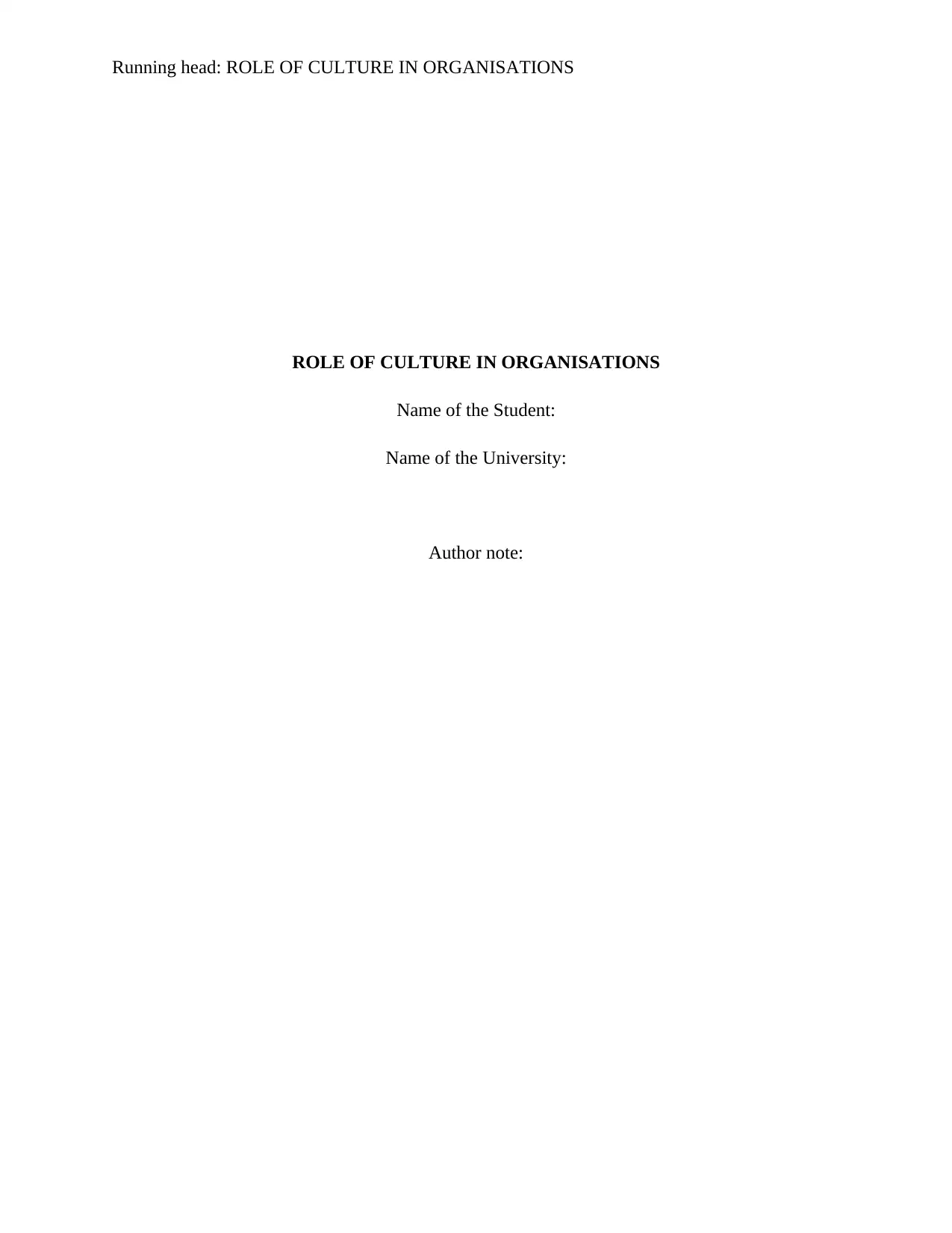
Running head: ROLE OF CULTURE IN ORGANISATIONS
ROLE OF CULTURE IN ORGANISATIONS
Name of the Student:
Name of the University:
Author note:
ROLE OF CULTURE IN ORGANISATIONS
Name of the Student:
Name of the University:
Author note:
Paraphrase This Document
Need a fresh take? Get an instant paraphrase of this document with our AI Paraphraser
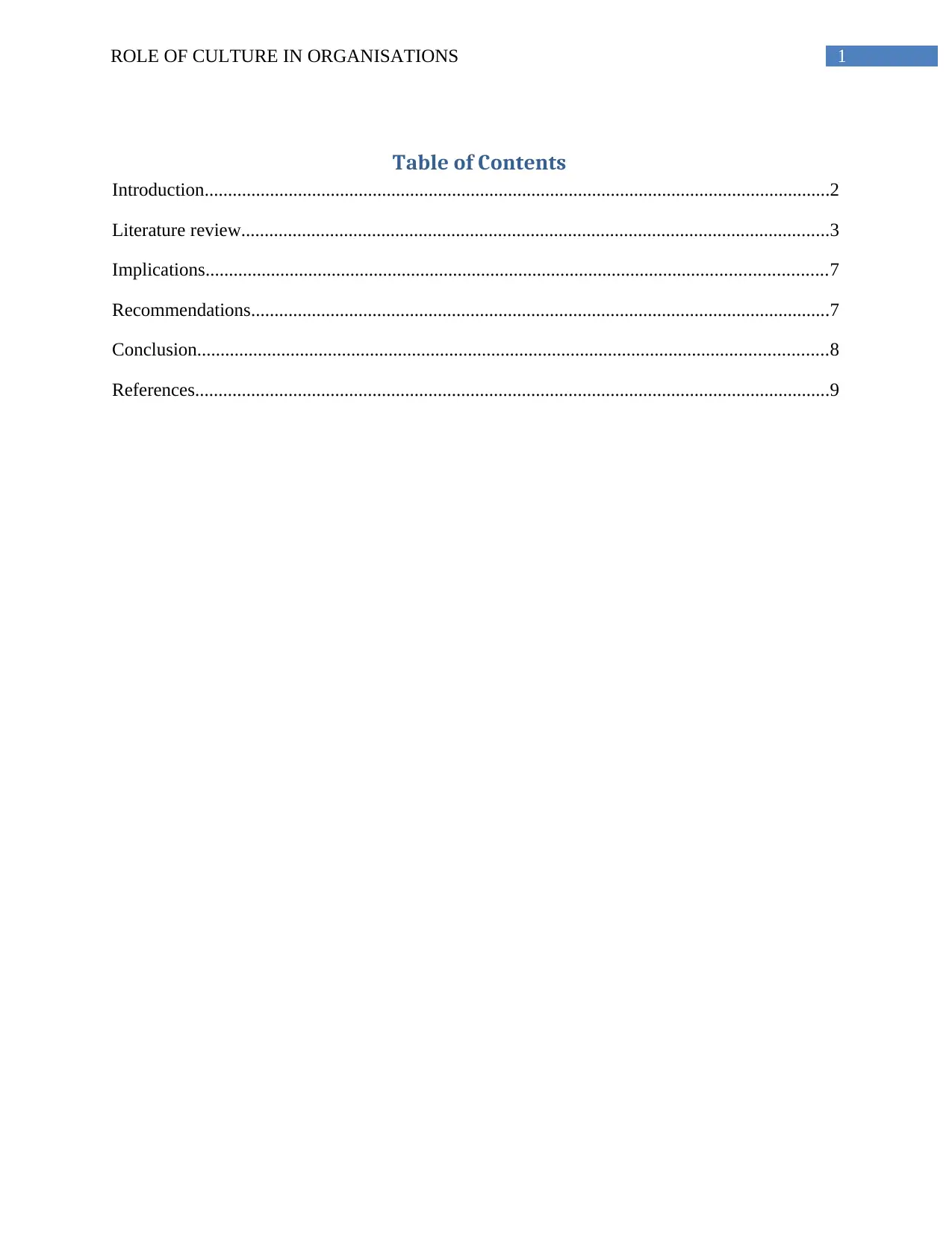
1ROLE OF CULTURE IN ORGANISATIONS
Table of Contents
Introduction......................................................................................................................................2
Literature review..............................................................................................................................3
Implications.....................................................................................................................................7
Recommendations............................................................................................................................7
Conclusion.......................................................................................................................................8
References........................................................................................................................................9
Table of Contents
Introduction......................................................................................................................................2
Literature review..............................................................................................................................3
Implications.....................................................................................................................................7
Recommendations............................................................................................................................7
Conclusion.......................................................................................................................................8
References........................................................................................................................................9
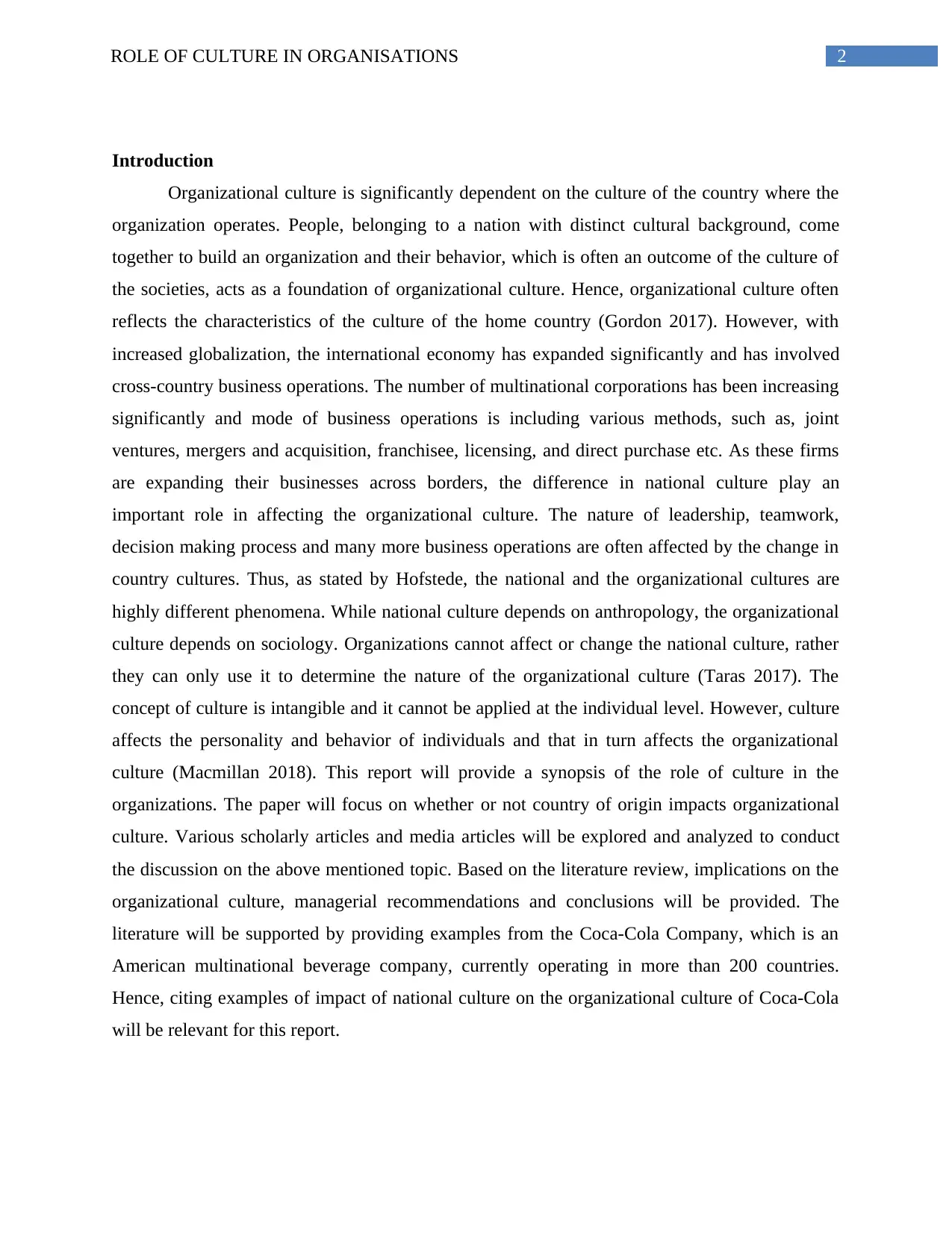
2ROLE OF CULTURE IN ORGANISATIONS
Introduction
Organizational culture is significantly dependent on the culture of the country where the
organization operates. People, belonging to a nation with distinct cultural background, come
together to build an organization and their behavior, which is often an outcome of the culture of
the societies, acts as a foundation of organizational culture. Hence, organizational culture often
reflects the characteristics of the culture of the home country (Gordon 2017). However, with
increased globalization, the international economy has expanded significantly and has involved
cross-country business operations. The number of multinational corporations has been increasing
significantly and mode of business operations is including various methods, such as, joint
ventures, mergers and acquisition, franchisee, licensing, and direct purchase etc. As these firms
are expanding their businesses across borders, the difference in national culture play an
important role in affecting the organizational culture. The nature of leadership, teamwork,
decision making process and many more business operations are often affected by the change in
country cultures. Thus, as stated by Hofstede, the national and the organizational cultures are
highly different phenomena. While national culture depends on anthropology, the organizational
culture depends on sociology. Organizations cannot affect or change the national culture, rather
they can only use it to determine the nature of the organizational culture (Taras 2017). The
concept of culture is intangible and it cannot be applied at the individual level. However, culture
affects the personality and behavior of individuals and that in turn affects the organizational
culture (Macmillan 2018). This report will provide a synopsis of the role of culture in the
organizations. The paper will focus on whether or not country of origin impacts organizational
culture. Various scholarly articles and media articles will be explored and analyzed to conduct
the discussion on the above mentioned topic. Based on the literature review, implications on the
organizational culture, managerial recommendations and conclusions will be provided. The
literature will be supported by providing examples from the Coca-Cola Company, which is an
American multinational beverage company, currently operating in more than 200 countries.
Hence, citing examples of impact of national culture on the organizational culture of Coca-Cola
will be relevant for this report.
Introduction
Organizational culture is significantly dependent on the culture of the country where the
organization operates. People, belonging to a nation with distinct cultural background, come
together to build an organization and their behavior, which is often an outcome of the culture of
the societies, acts as a foundation of organizational culture. Hence, organizational culture often
reflects the characteristics of the culture of the home country (Gordon 2017). However, with
increased globalization, the international economy has expanded significantly and has involved
cross-country business operations. The number of multinational corporations has been increasing
significantly and mode of business operations is including various methods, such as, joint
ventures, mergers and acquisition, franchisee, licensing, and direct purchase etc. As these firms
are expanding their businesses across borders, the difference in national culture play an
important role in affecting the organizational culture. The nature of leadership, teamwork,
decision making process and many more business operations are often affected by the change in
country cultures. Thus, as stated by Hofstede, the national and the organizational cultures are
highly different phenomena. While national culture depends on anthropology, the organizational
culture depends on sociology. Organizations cannot affect or change the national culture, rather
they can only use it to determine the nature of the organizational culture (Taras 2017). The
concept of culture is intangible and it cannot be applied at the individual level. However, culture
affects the personality and behavior of individuals and that in turn affects the organizational
culture (Macmillan 2018). This report will provide a synopsis of the role of culture in the
organizations. The paper will focus on whether or not country of origin impacts organizational
culture. Various scholarly articles and media articles will be explored and analyzed to conduct
the discussion on the above mentioned topic. Based on the literature review, implications on the
organizational culture, managerial recommendations and conclusions will be provided. The
literature will be supported by providing examples from the Coca-Cola Company, which is an
American multinational beverage company, currently operating in more than 200 countries.
Hence, citing examples of impact of national culture on the organizational culture of Coca-Cola
will be relevant for this report.
⊘ This is a preview!⊘
Do you want full access?
Subscribe today to unlock all pages.

Trusted by 1+ million students worldwide
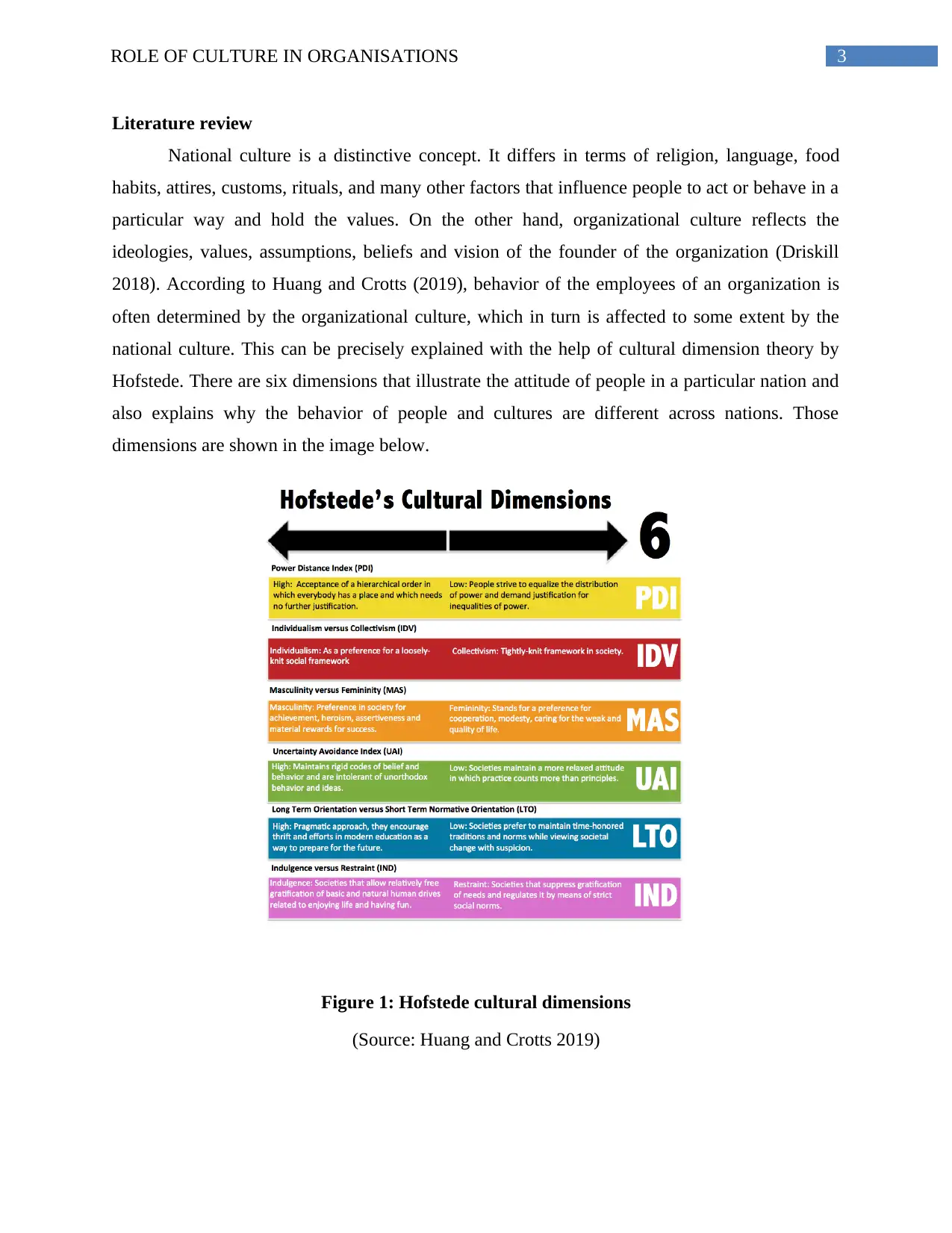
3ROLE OF CULTURE IN ORGANISATIONS
Literature review
National culture is a distinctive concept. It differs in terms of religion, language, food
habits, attires, customs, rituals, and many other factors that influence people to act or behave in a
particular way and hold the values. On the other hand, organizational culture reflects the
ideologies, values, assumptions, beliefs and vision of the founder of the organization (Driskill
2018). According to Huang and Crotts (2019), behavior of the employees of an organization is
often determined by the organizational culture, which in turn is affected to some extent by the
national culture. This can be precisely explained with the help of cultural dimension theory by
Hofstede. There are six dimensions that illustrate the attitude of people in a particular nation and
also explains why the behavior of people and cultures are different across nations. Those
dimensions are shown in the image below.
Figure 1: Hofstede cultural dimensions
(Source: Huang and Crotts 2019)
Literature review
National culture is a distinctive concept. It differs in terms of religion, language, food
habits, attires, customs, rituals, and many other factors that influence people to act or behave in a
particular way and hold the values. On the other hand, organizational culture reflects the
ideologies, values, assumptions, beliefs and vision of the founder of the organization (Driskill
2018). According to Huang and Crotts (2019), behavior of the employees of an organization is
often determined by the organizational culture, which in turn is affected to some extent by the
national culture. This can be precisely explained with the help of cultural dimension theory by
Hofstede. There are six dimensions that illustrate the attitude of people in a particular nation and
also explains why the behavior of people and cultures are different across nations. Those
dimensions are shown in the image below.
Figure 1: Hofstede cultural dimensions
(Source: Huang and Crotts 2019)
Paraphrase This Document
Need a fresh take? Get an instant paraphrase of this document with our AI Paraphraser
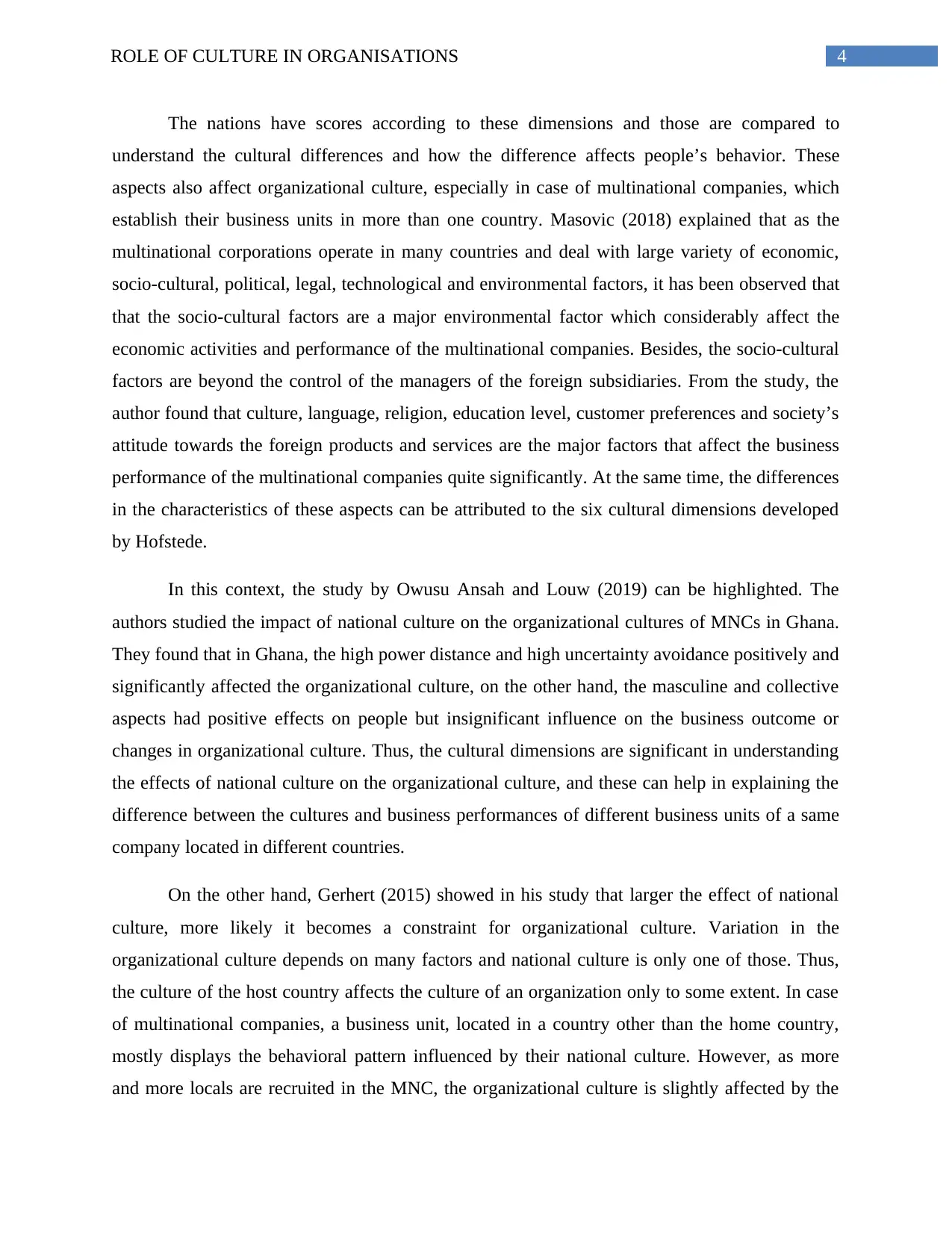
4ROLE OF CULTURE IN ORGANISATIONS
The nations have scores according to these dimensions and those are compared to
understand the cultural differences and how the difference affects people’s behavior. These
aspects also affect organizational culture, especially in case of multinational companies, which
establish their business units in more than one country. Masovic (2018) explained that as the
multinational corporations operate in many countries and deal with large variety of economic,
socio-cultural, political, legal, technological and environmental factors, it has been observed that
that the socio-cultural factors are a major environmental factor which considerably affect the
economic activities and performance of the multinational companies. Besides, the socio-cultural
factors are beyond the control of the managers of the foreign subsidiaries. From the study, the
author found that culture, language, religion, education level, customer preferences and society’s
attitude towards the foreign products and services are the major factors that affect the business
performance of the multinational companies quite significantly. At the same time, the differences
in the characteristics of these aspects can be attributed to the six cultural dimensions developed
by Hofstede.
In this context, the study by Owusu Ansah and Louw (2019) can be highlighted. The
authors studied the impact of national culture on the organizational cultures of MNCs in Ghana.
They found that in Ghana, the high power distance and high uncertainty avoidance positively and
significantly affected the organizational culture, on the other hand, the masculine and collective
aspects had positive effects on people but insignificant influence on the business outcome or
changes in organizational culture. Thus, the cultural dimensions are significant in understanding
the effects of national culture on the organizational culture, and these can help in explaining the
difference between the cultures and business performances of different business units of a same
company located in different countries.
On the other hand, Gerhert (2015) showed in his study that larger the effect of national
culture, more likely it becomes a constraint for organizational culture. Variation in the
organizational culture depends on many factors and national culture is only one of those. Thus,
the culture of the host country affects the culture of an organization only to some extent. In case
of multinational companies, a business unit, located in a country other than the home country,
mostly displays the behavioral pattern influenced by their national culture. However, as more
and more locals are recruited in the MNC, the organizational culture is slightly affected by the
The nations have scores according to these dimensions and those are compared to
understand the cultural differences and how the difference affects people’s behavior. These
aspects also affect organizational culture, especially in case of multinational companies, which
establish their business units in more than one country. Masovic (2018) explained that as the
multinational corporations operate in many countries and deal with large variety of economic,
socio-cultural, political, legal, technological and environmental factors, it has been observed that
that the socio-cultural factors are a major environmental factor which considerably affect the
economic activities and performance of the multinational companies. Besides, the socio-cultural
factors are beyond the control of the managers of the foreign subsidiaries. From the study, the
author found that culture, language, religion, education level, customer preferences and society’s
attitude towards the foreign products and services are the major factors that affect the business
performance of the multinational companies quite significantly. At the same time, the differences
in the characteristics of these aspects can be attributed to the six cultural dimensions developed
by Hofstede.
In this context, the study by Owusu Ansah and Louw (2019) can be highlighted. The
authors studied the impact of national culture on the organizational cultures of MNCs in Ghana.
They found that in Ghana, the high power distance and high uncertainty avoidance positively and
significantly affected the organizational culture, on the other hand, the masculine and collective
aspects had positive effects on people but insignificant influence on the business outcome or
changes in organizational culture. Thus, the cultural dimensions are significant in understanding
the effects of national culture on the organizational culture, and these can help in explaining the
difference between the cultures and business performances of different business units of a same
company located in different countries.
On the other hand, Gerhert (2015) showed in his study that larger the effect of national
culture, more likely it becomes a constraint for organizational culture. Variation in the
organizational culture depends on many factors and national culture is only one of those. Thus,
the culture of the host country affects the culture of an organization only to some extent. In case
of multinational companies, a business unit, located in a country other than the home country,
mostly displays the behavioral pattern influenced by their national culture. However, as more
and more locals are recruited in the MNC, the organizational culture is slightly affected by the
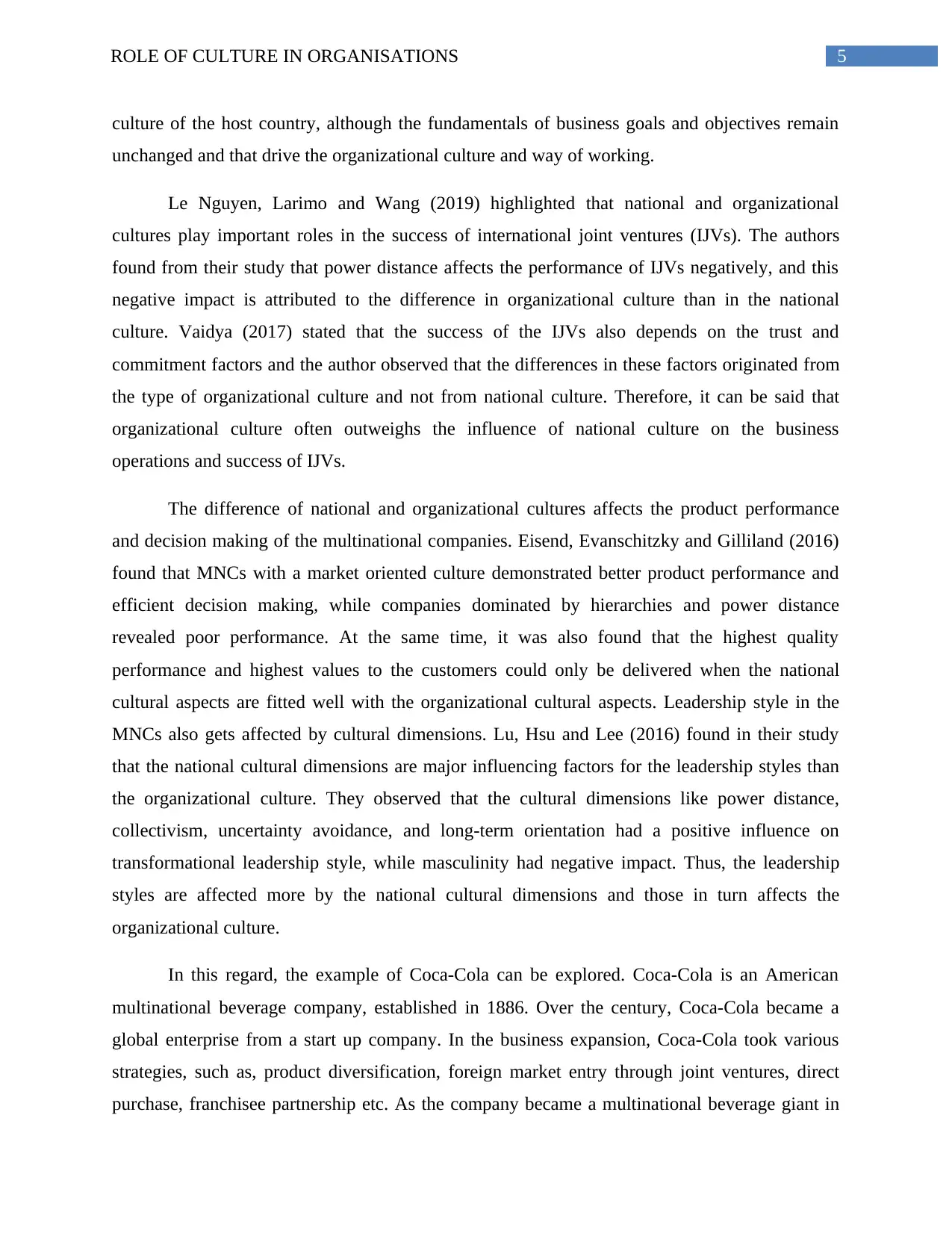
5ROLE OF CULTURE IN ORGANISATIONS
culture of the host country, although the fundamentals of business goals and objectives remain
unchanged and that drive the organizational culture and way of working.
Le Nguyen, Larimo and Wang (2019) highlighted that national and organizational
cultures play important roles in the success of international joint ventures (IJVs). The authors
found from their study that power distance affects the performance of IJVs negatively, and this
negative impact is attributed to the difference in organizational culture than in the national
culture. Vaidya (2017) stated that the success of the IJVs also depends on the trust and
commitment factors and the author observed that the differences in these factors originated from
the type of organizational culture and not from national culture. Therefore, it can be said that
organizational culture often outweighs the influence of national culture on the business
operations and success of IJVs.
The difference of national and organizational cultures affects the product performance
and decision making of the multinational companies. Eisend, Evanschitzky and Gilliland (2016)
found that MNCs with a market oriented culture demonstrated better product performance and
efficient decision making, while companies dominated by hierarchies and power distance
revealed poor performance. At the same time, it was also found that the highest quality
performance and highest values to the customers could only be delivered when the national
cultural aspects are fitted well with the organizational cultural aspects. Leadership style in the
MNCs also gets affected by cultural dimensions. Lu, Hsu and Lee (2016) found in their study
that the national cultural dimensions are major influencing factors for the leadership styles than
the organizational culture. They observed that the cultural dimensions like power distance,
collectivism, uncertainty avoidance, and long-term orientation had a positive influence on
transformational leadership style, while masculinity had negative impact. Thus, the leadership
styles are affected more by the national cultural dimensions and those in turn affects the
organizational culture.
In this regard, the example of Coca-Cola can be explored. Coca-Cola is an American
multinational beverage company, established in 1886. Over the century, Coca-Cola became a
global enterprise from a start up company. In the business expansion, Coca-Cola took various
strategies, such as, product diversification, foreign market entry through joint ventures, direct
purchase, franchisee partnership etc. As the company became a multinational beverage giant in
culture of the host country, although the fundamentals of business goals and objectives remain
unchanged and that drive the organizational culture and way of working.
Le Nguyen, Larimo and Wang (2019) highlighted that national and organizational
cultures play important roles in the success of international joint ventures (IJVs). The authors
found from their study that power distance affects the performance of IJVs negatively, and this
negative impact is attributed to the difference in organizational culture than in the national
culture. Vaidya (2017) stated that the success of the IJVs also depends on the trust and
commitment factors and the author observed that the differences in these factors originated from
the type of organizational culture and not from national culture. Therefore, it can be said that
organizational culture often outweighs the influence of national culture on the business
operations and success of IJVs.
The difference of national and organizational cultures affects the product performance
and decision making of the multinational companies. Eisend, Evanschitzky and Gilliland (2016)
found that MNCs with a market oriented culture demonstrated better product performance and
efficient decision making, while companies dominated by hierarchies and power distance
revealed poor performance. At the same time, it was also found that the highest quality
performance and highest values to the customers could only be delivered when the national
cultural aspects are fitted well with the organizational cultural aspects. Leadership style in the
MNCs also gets affected by cultural dimensions. Lu, Hsu and Lee (2016) found in their study
that the national cultural dimensions are major influencing factors for the leadership styles than
the organizational culture. They observed that the cultural dimensions like power distance,
collectivism, uncertainty avoidance, and long-term orientation had a positive influence on
transformational leadership style, while masculinity had negative impact. Thus, the leadership
styles are affected more by the national cultural dimensions and those in turn affects the
organizational culture.
In this regard, the example of Coca-Cola can be explored. Coca-Cola is an American
multinational beverage company, established in 1886. Over the century, Coca-Cola became a
global enterprise from a start up company. In the business expansion, Coca-Cola took various
strategies, such as, product diversification, foreign market entry through joint ventures, direct
purchase, franchisee partnership etc. As the company became a multinational beverage giant in
⊘ This is a preview!⊘
Do you want full access?
Subscribe today to unlock all pages.

Trusted by 1+ million students worldwide
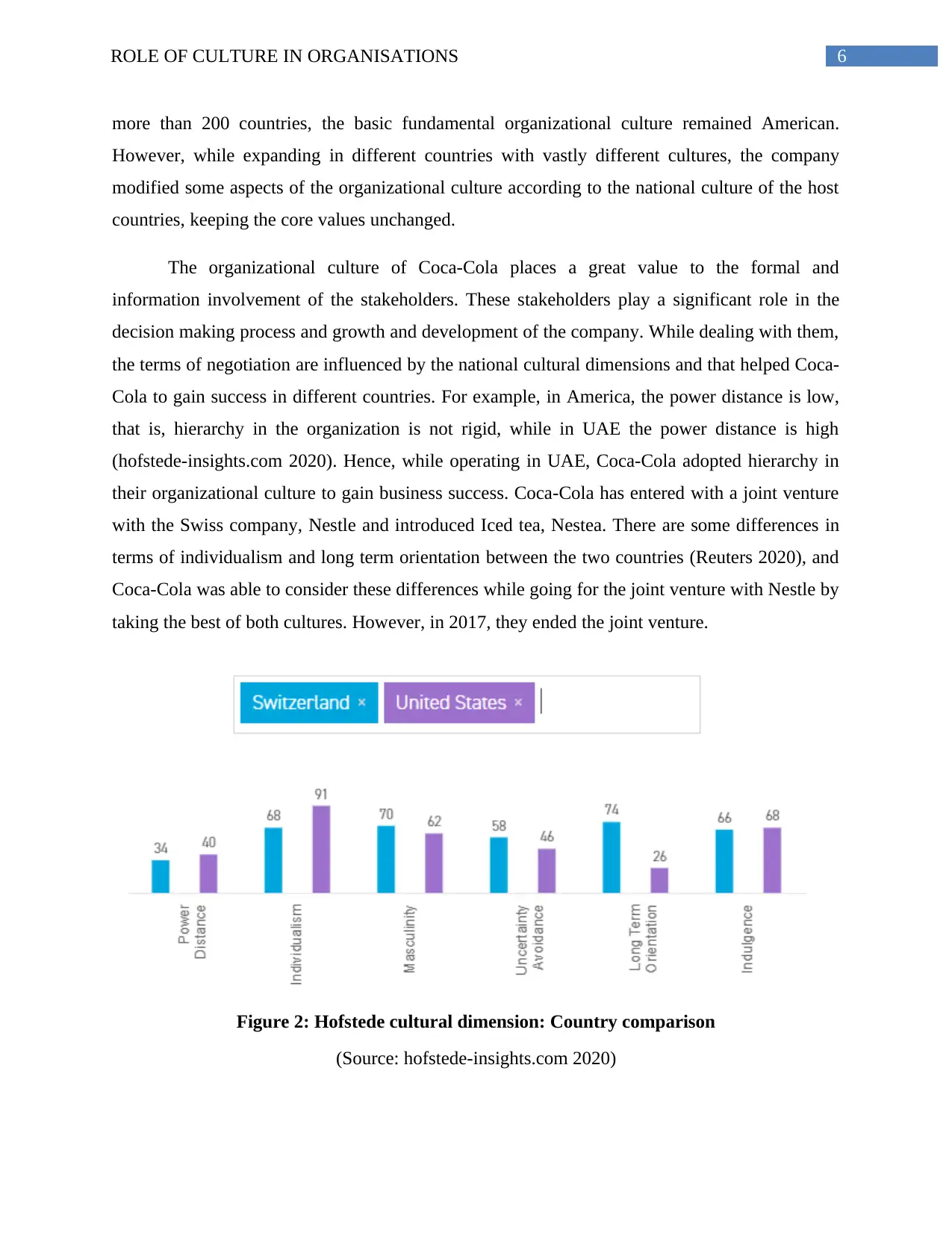
6ROLE OF CULTURE IN ORGANISATIONS
more than 200 countries, the basic fundamental organizational culture remained American.
However, while expanding in different countries with vastly different cultures, the company
modified some aspects of the organizational culture according to the national culture of the host
countries, keeping the core values unchanged.
The organizational culture of Coca-Cola places a great value to the formal and
information involvement of the stakeholders. These stakeholders play a significant role in the
decision making process and growth and development of the company. While dealing with them,
the terms of negotiation are influenced by the national cultural dimensions and that helped Coca-
Cola to gain success in different countries. For example, in America, the power distance is low,
that is, hierarchy in the organization is not rigid, while in UAE the power distance is high
(hofstede-insights.com 2020). Hence, while operating in UAE, Coca-Cola adopted hierarchy in
their organizational culture to gain business success. Coca-Cola has entered with a joint venture
with the Swiss company, Nestle and introduced Iced tea, Nestea. There are some differences in
terms of individualism and long term orientation between the two countries (Reuters 2020), and
Coca-Cola was able to consider these differences while going for the joint venture with Nestle by
taking the best of both cultures. However, in 2017, they ended the joint venture.
Figure 2: Hofstede cultural dimension: Country comparison
(Source: hofstede-insights.com 2020)
more than 200 countries, the basic fundamental organizational culture remained American.
However, while expanding in different countries with vastly different cultures, the company
modified some aspects of the organizational culture according to the national culture of the host
countries, keeping the core values unchanged.
The organizational culture of Coca-Cola places a great value to the formal and
information involvement of the stakeholders. These stakeholders play a significant role in the
decision making process and growth and development of the company. While dealing with them,
the terms of negotiation are influenced by the national cultural dimensions and that helped Coca-
Cola to gain success in different countries. For example, in America, the power distance is low,
that is, hierarchy in the organization is not rigid, while in UAE the power distance is high
(hofstede-insights.com 2020). Hence, while operating in UAE, Coca-Cola adopted hierarchy in
their organizational culture to gain business success. Coca-Cola has entered with a joint venture
with the Swiss company, Nestle and introduced Iced tea, Nestea. There are some differences in
terms of individualism and long term orientation between the two countries (Reuters 2020), and
Coca-Cola was able to consider these differences while going for the joint venture with Nestle by
taking the best of both cultures. However, in 2017, they ended the joint venture.
Figure 2: Hofstede cultural dimension: Country comparison
(Source: hofstede-insights.com 2020)
Paraphrase This Document
Need a fresh take? Get an instant paraphrase of this document with our AI Paraphraser
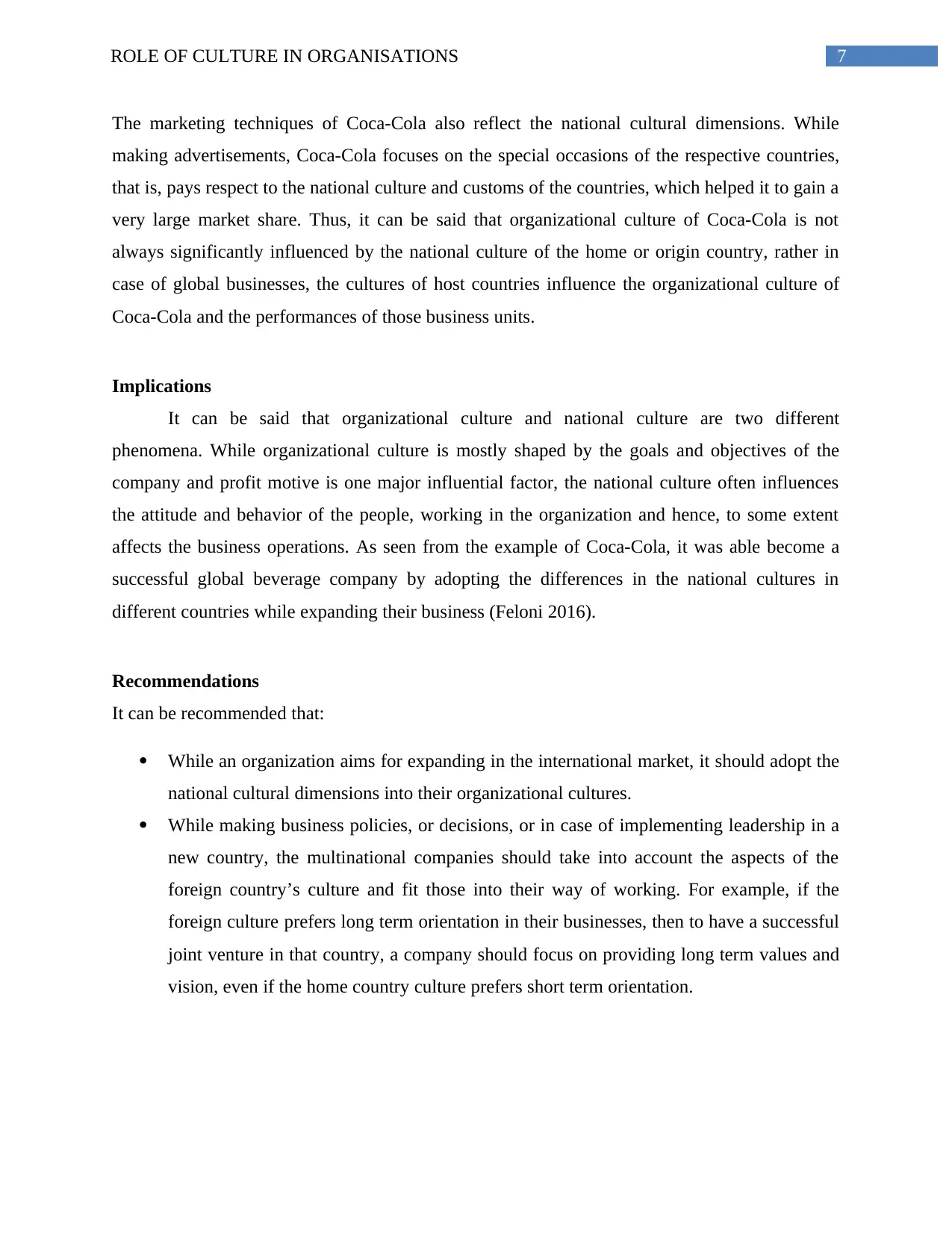
7ROLE OF CULTURE IN ORGANISATIONS
The marketing techniques of Coca-Cola also reflect the national cultural dimensions. While
making advertisements, Coca-Cola focuses on the special occasions of the respective countries,
that is, pays respect to the national culture and customs of the countries, which helped it to gain a
very large market share. Thus, it can be said that organizational culture of Coca-Cola is not
always significantly influenced by the national culture of the home or origin country, rather in
case of global businesses, the cultures of host countries influence the organizational culture of
Coca-Cola and the performances of those business units.
Implications
It can be said that organizational culture and national culture are two different
phenomena. While organizational culture is mostly shaped by the goals and objectives of the
company and profit motive is one major influential factor, the national culture often influences
the attitude and behavior of the people, working in the organization and hence, to some extent
affects the business operations. As seen from the example of Coca-Cola, it was able become a
successful global beverage company by adopting the differences in the national cultures in
different countries while expanding their business (Feloni 2016).
Recommendations
It can be recommended that:
While an organization aims for expanding in the international market, it should adopt the
national cultural dimensions into their organizational cultures.
While making business policies, or decisions, or in case of implementing leadership in a
new country, the multinational companies should take into account the aspects of the
foreign country’s culture and fit those into their way of working. For example, if the
foreign culture prefers long term orientation in their businesses, then to have a successful
joint venture in that country, a company should focus on providing long term values and
vision, even if the home country culture prefers short term orientation.
The marketing techniques of Coca-Cola also reflect the national cultural dimensions. While
making advertisements, Coca-Cola focuses on the special occasions of the respective countries,
that is, pays respect to the national culture and customs of the countries, which helped it to gain a
very large market share. Thus, it can be said that organizational culture of Coca-Cola is not
always significantly influenced by the national culture of the home or origin country, rather in
case of global businesses, the cultures of host countries influence the organizational culture of
Coca-Cola and the performances of those business units.
Implications
It can be said that organizational culture and national culture are two different
phenomena. While organizational culture is mostly shaped by the goals and objectives of the
company and profit motive is one major influential factor, the national culture often influences
the attitude and behavior of the people, working in the organization and hence, to some extent
affects the business operations. As seen from the example of Coca-Cola, it was able become a
successful global beverage company by adopting the differences in the national cultures in
different countries while expanding their business (Feloni 2016).
Recommendations
It can be recommended that:
While an organization aims for expanding in the international market, it should adopt the
national cultural dimensions into their organizational cultures.
While making business policies, or decisions, or in case of implementing leadership in a
new country, the multinational companies should take into account the aspects of the
foreign country’s culture and fit those into their way of working. For example, if the
foreign culture prefers long term orientation in their businesses, then to have a successful
joint venture in that country, a company should focus on providing long term values and
vision, even if the home country culture prefers short term orientation.
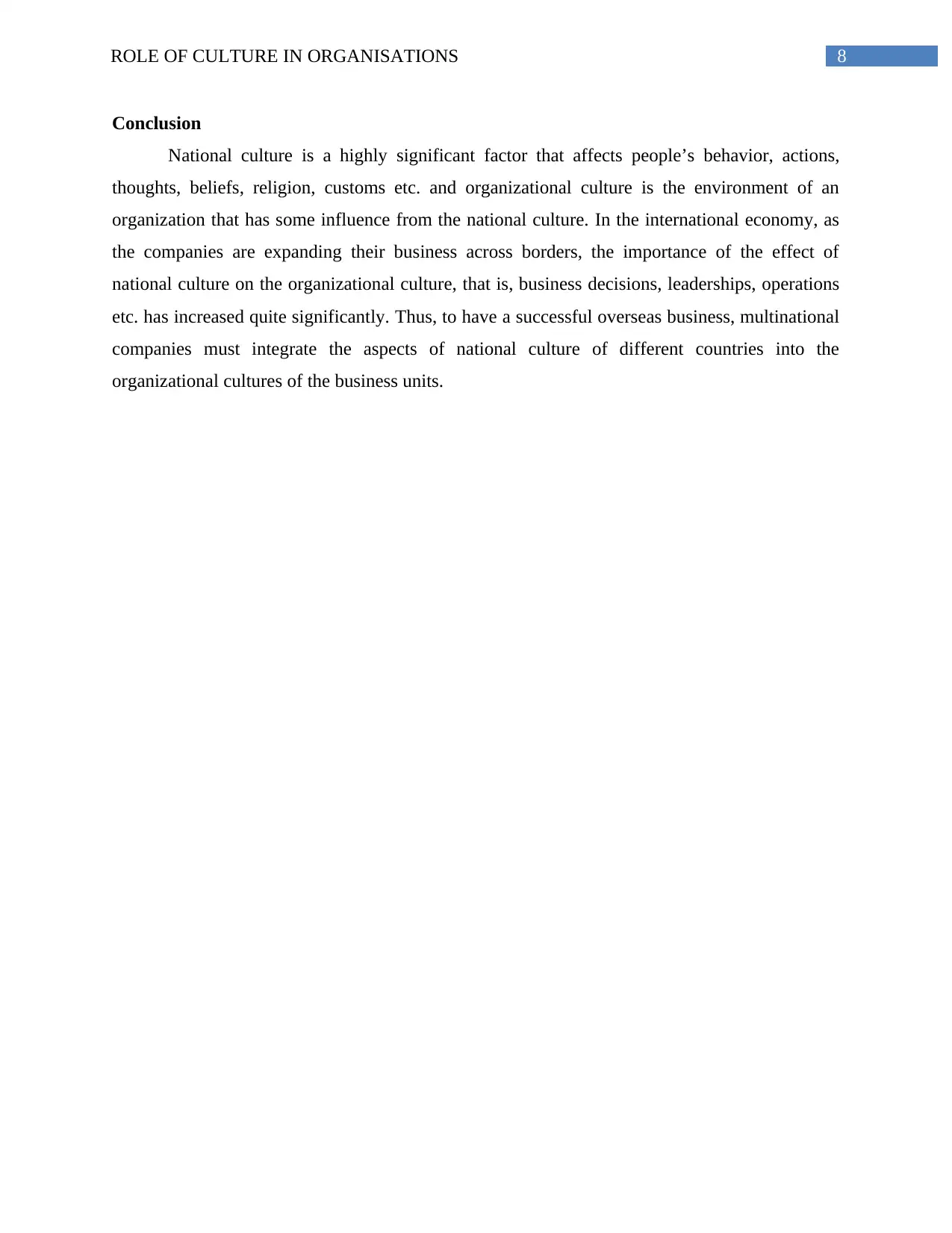
8ROLE OF CULTURE IN ORGANISATIONS
Conclusion
National culture is a highly significant factor that affects people’s behavior, actions,
thoughts, beliefs, religion, customs etc. and organizational culture is the environment of an
organization that has some influence from the national culture. In the international economy, as
the companies are expanding their business across borders, the importance of the effect of
national culture on the organizational culture, that is, business decisions, leaderships, operations
etc. has increased quite significantly. Thus, to have a successful overseas business, multinational
companies must integrate the aspects of national culture of different countries into the
organizational cultures of the business units.
Conclusion
National culture is a highly significant factor that affects people’s behavior, actions,
thoughts, beliefs, religion, customs etc. and organizational culture is the environment of an
organization that has some influence from the national culture. In the international economy, as
the companies are expanding their business across borders, the importance of the effect of
national culture on the organizational culture, that is, business decisions, leaderships, operations
etc. has increased quite significantly. Thus, to have a successful overseas business, multinational
companies must integrate the aspects of national culture of different countries into the
organizational cultures of the business units.
⊘ This is a preview!⊘
Do you want full access?
Subscribe today to unlock all pages.

Trusted by 1+ million students worldwide
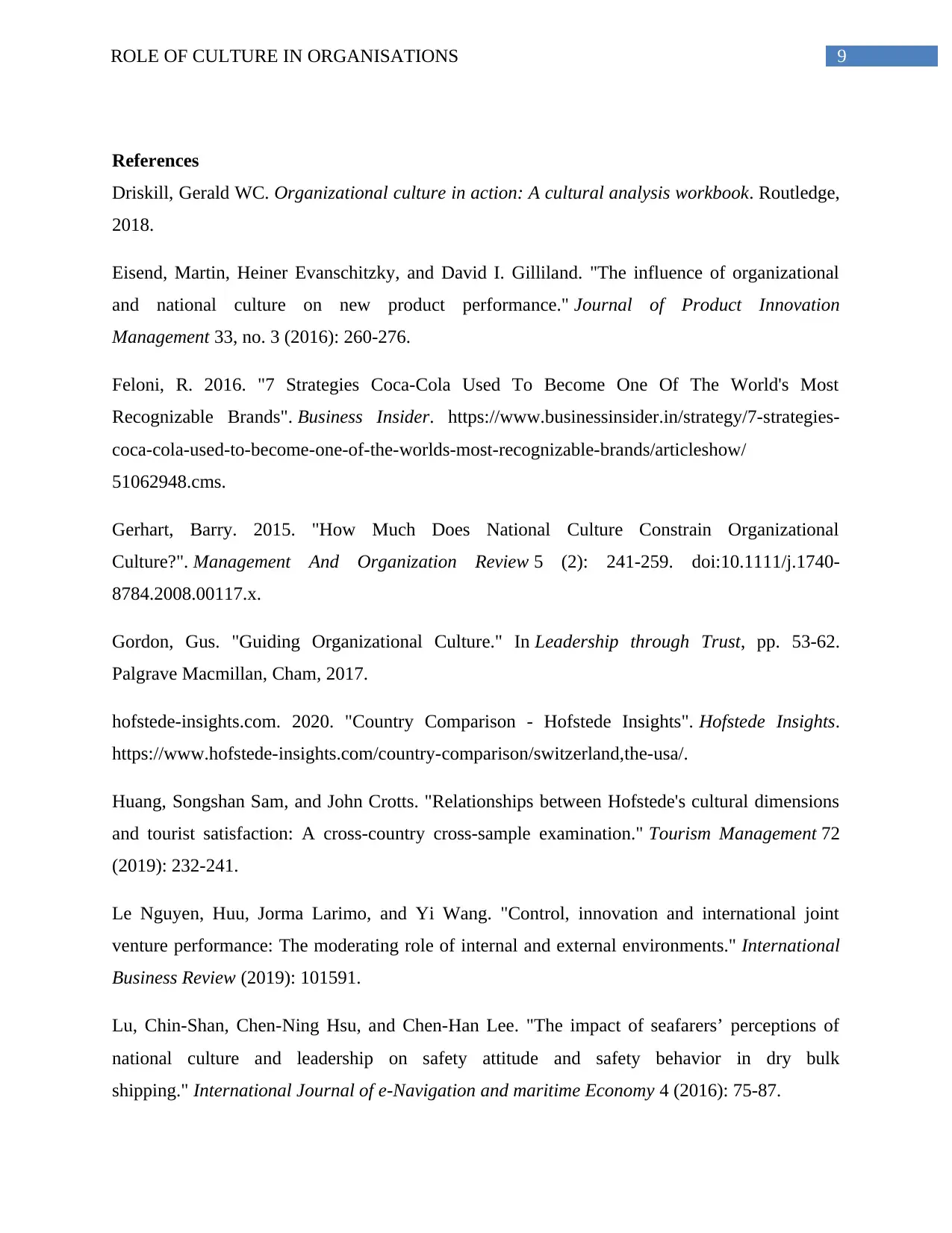
9ROLE OF CULTURE IN ORGANISATIONS
References
Driskill, Gerald WC. Organizational culture in action: A cultural analysis workbook. Routledge,
2018.
Eisend, Martin, Heiner Evanschitzky, and David I. Gilliland. "The influence of organizational
and national culture on new product performance." Journal of Product Innovation
Management 33, no. 3 (2016): 260-276.
Feloni, R. 2016. "7 Strategies Coca-Cola Used To Become One Of The World's Most
Recognizable Brands". Business Insider. https://www.businessinsider.in/strategy/7-strategies-
coca-cola-used-to-become-one-of-the-worlds-most-recognizable-brands/articleshow/
51062948.cms.
Gerhart, Barry. 2015. "How Much Does National Culture Constrain Organizational
Culture?". Management And Organization Review 5 (2): 241-259. doi:10.1111/j.1740-
8784.2008.00117.x.
Gordon, Gus. "Guiding Organizational Culture." In Leadership through Trust, pp. 53-62.
Palgrave Macmillan, Cham, 2017.
hofstede-insights.com. 2020. "Country Comparison - Hofstede Insights". Hofstede Insights.
https://www.hofstede-insights.com/country-comparison/switzerland,the-usa/.
Huang, Songshan Sam, and John Crotts. "Relationships between Hofstede's cultural dimensions
and tourist satisfaction: A cross-country cross-sample examination." Tourism Management 72
(2019): 232-241.
Le Nguyen, Huu, Jorma Larimo, and Yi Wang. "Control, innovation and international joint
venture performance: The moderating role of internal and external environments." International
Business Review (2019): 101591.
Lu, Chin-Shan, Chen-Ning Hsu, and Chen-Han Lee. "The impact of seafarers’ perceptions of
national culture and leadership on safety attitude and safety behavior in dry bulk
shipping." International Journal of e-Navigation and maritime Economy 4 (2016): 75-87.
References
Driskill, Gerald WC. Organizational culture in action: A cultural analysis workbook. Routledge,
2018.
Eisend, Martin, Heiner Evanschitzky, and David I. Gilliland. "The influence of organizational
and national culture on new product performance." Journal of Product Innovation
Management 33, no. 3 (2016): 260-276.
Feloni, R. 2016. "7 Strategies Coca-Cola Used To Become One Of The World's Most
Recognizable Brands". Business Insider. https://www.businessinsider.in/strategy/7-strategies-
coca-cola-used-to-become-one-of-the-worlds-most-recognizable-brands/articleshow/
51062948.cms.
Gerhart, Barry. 2015. "How Much Does National Culture Constrain Organizational
Culture?". Management And Organization Review 5 (2): 241-259. doi:10.1111/j.1740-
8784.2008.00117.x.
Gordon, Gus. "Guiding Organizational Culture." In Leadership through Trust, pp. 53-62.
Palgrave Macmillan, Cham, 2017.
hofstede-insights.com. 2020. "Country Comparison - Hofstede Insights". Hofstede Insights.
https://www.hofstede-insights.com/country-comparison/switzerland,the-usa/.
Huang, Songshan Sam, and John Crotts. "Relationships between Hofstede's cultural dimensions
and tourist satisfaction: A cross-country cross-sample examination." Tourism Management 72
(2019): 232-241.
Le Nguyen, Huu, Jorma Larimo, and Yi Wang. "Control, innovation and international joint
venture performance: The moderating role of internal and external environments." International
Business Review (2019): 101591.
Lu, Chin-Shan, Chen-Ning Hsu, and Chen-Han Lee. "The impact of seafarers’ perceptions of
national culture and leadership on safety attitude and safety behavior in dry bulk
shipping." International Journal of e-Navigation and maritime Economy 4 (2016): 75-87.
Paraphrase This Document
Need a fresh take? Get an instant paraphrase of this document with our AI Paraphraser
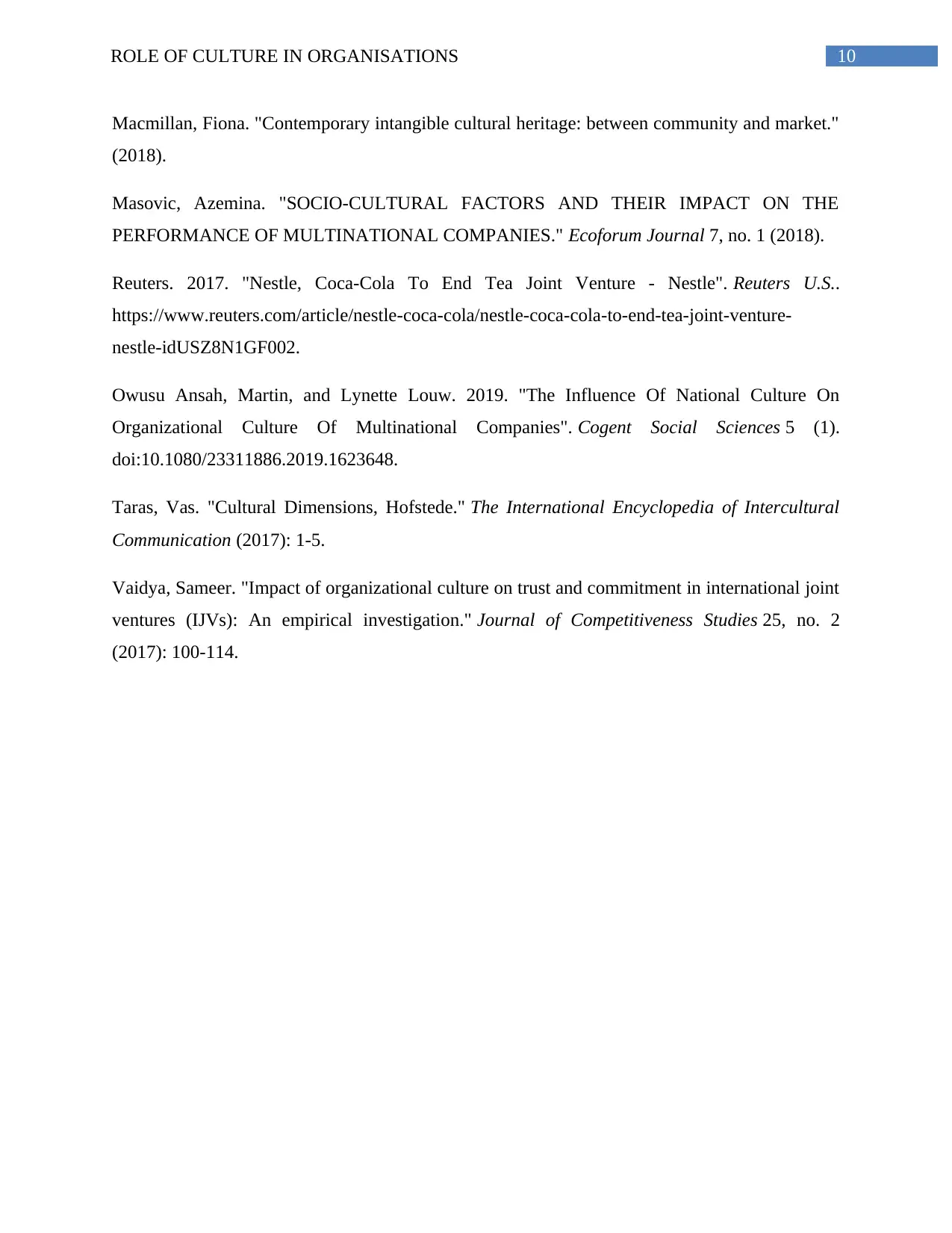
10ROLE OF CULTURE IN ORGANISATIONS
Macmillan, Fiona. "Contemporary intangible cultural heritage: between community and market."
(2018).
Masovic, Azemina. "SOCIO-CULTURAL FACTORS AND THEIR IMPACT ON THE
PERFORMANCE OF MULTINATIONAL COMPANIES." Ecoforum Journal 7, no. 1 (2018).
Reuters. 2017. "Nestle, Coca-Cola To End Tea Joint Venture - Nestle". Reuters U.S..
https://www.reuters.com/article/nestle-coca-cola/nestle-coca-cola-to-end-tea-joint-venture-
nestle-idUSZ8N1GF002.
Owusu Ansah, Martin, and Lynette Louw. 2019. "The Influence Of National Culture On
Organizational Culture Of Multinational Companies". Cogent Social Sciences 5 (1).
doi:10.1080/23311886.2019.1623648.
Taras, Vas. "Cultural Dimensions, Hofstede." The International Encyclopedia of Intercultural
Communication (2017): 1-5.
Vaidya, Sameer. "Impact of organizational culture on trust and commitment in international joint
ventures (IJVs): An empirical investigation." Journal of Competitiveness Studies 25, no. 2
(2017): 100-114.
Macmillan, Fiona. "Contemporary intangible cultural heritage: between community and market."
(2018).
Masovic, Azemina. "SOCIO-CULTURAL FACTORS AND THEIR IMPACT ON THE
PERFORMANCE OF MULTINATIONAL COMPANIES." Ecoforum Journal 7, no. 1 (2018).
Reuters. 2017. "Nestle, Coca-Cola To End Tea Joint Venture - Nestle". Reuters U.S..
https://www.reuters.com/article/nestle-coca-cola/nestle-coca-cola-to-end-tea-joint-venture-
nestle-idUSZ8N1GF002.
Owusu Ansah, Martin, and Lynette Louw. 2019. "The Influence Of National Culture On
Organizational Culture Of Multinational Companies". Cogent Social Sciences 5 (1).
doi:10.1080/23311886.2019.1623648.
Taras, Vas. "Cultural Dimensions, Hofstede." The International Encyclopedia of Intercultural
Communication (2017): 1-5.
Vaidya, Sameer. "Impact of organizational culture on trust and commitment in international joint
ventures (IJVs): An empirical investigation." Journal of Competitiveness Studies 25, no. 2
(2017): 100-114.
1 out of 11
Related Documents
Your All-in-One AI-Powered Toolkit for Academic Success.
+13062052269
info@desklib.com
Available 24*7 on WhatsApp / Email
![[object Object]](/_next/static/media/star-bottom.7253800d.svg)
Unlock your academic potential
Copyright © 2020–2026 A2Z Services. All Rights Reserved. Developed and managed by ZUCOL.




